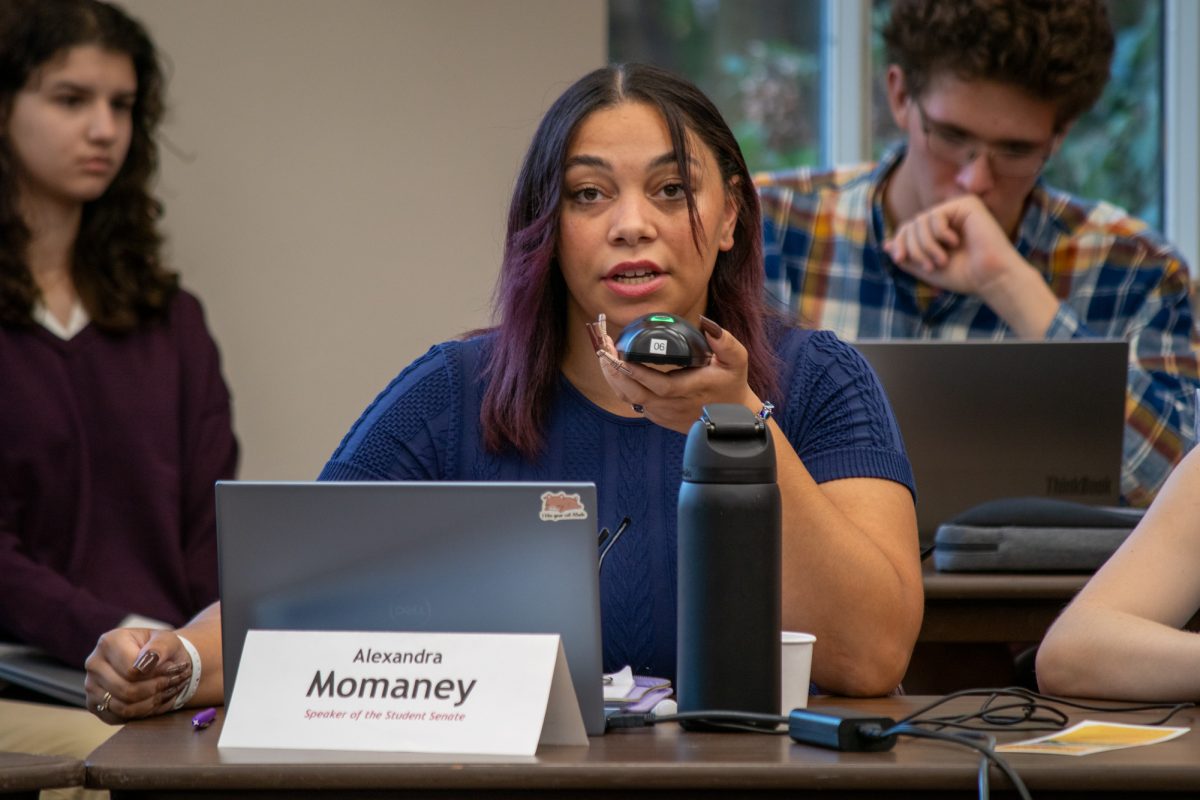Suicide Machines disc may be ticket to ‘TRL’
February 2, 2000
Daily Staff Writer
“The Suicide Machines”
The Suicide Machines
Major players in the Midwest punk scene for nearly a decade, The Suicide Machines have played everywhere from friends’ basements to church auditoriums and run-down bowling alleys.
The band’s DIY ethic has remained strong through the years, but on the new self-titled album, the guys lose some of their punk rebelliousness.
It’s not necessarily a bad thing, though.
If a band puts out the same album three times in a row, the idea gets stale, and that’s something this Detroit quartet has obviously learned.
Out of nowhere in 1996, The Suicide Machines inked a deal with major label Hollywood Records, releasing the near-flawless punk milestone “Destruction By Definition.”
Formerly known as Jack Kevorkian and the Suicide Machines, the band was forced to change its name when it scored that record deal.
Four years later, The Suicide Machines serve up alternative pop music, brought to you from a band that’s punk roots are concealed more and more with each album.
On “The Suicide Machines,” hitting stores Feb. 15, there’s only a handful of punk and ska songs to choose from.
Drenched in vocal harmonies and pop hooks, “Sometimes I Don’t Mind” is destined to be a hit on alternative radio, and it even packs enough bubble gum to possibly make it onto MTV’s “TRL.” That is if MTV opens up its mind a little more.
In essence, it’s a love song about a guy and his dog, a clever concept that works perfectly.
“Well you’re always on my mind/ Every day is like the first day/ And I talk to you sometimes even though you don’t talk back/ And I buy you things some times ’cause I don’t mind,” the song says.
Ironically, the new style is less formulaic than the dry, methodical sound of the masses of “non-conformist” late ’90s punk bands.
While it does have a more produced, clean-cut feel to it than past Suicide Machines efforts, punkers shouldn’t be turned off.
“The Suicide Machines” is a perfectly valid musical expression despite the fact that most of it doesn’t fall under the category of what many would call “punk” music.
The signature pop-punk of “All Out” and “Green” (two of the few “punk” selections) sharply contrast with “The Fade Away,” which incorporates violin music in the instrumental break.
“I Never Promised You a Rose Garden” scarily takes the strings idea and runs wild, layering violin sounds under a ska backbeat.
“Goodbye For Now” has the same energy as an Irish drinking song, marking it one of the album’s high points.
The hardcore punk of “Reasons” brings to mind the same feeling of the band’s cover of DC hardcore band Minor Threat’s “I Don’t Wanna Hear It.”
“I Hate Everything,” with it’s chorus of — surprise — “Fuck you/ I hate everything,” sharply juxtaposes “Extraordinary,” an easygoing song which features an instrumental break of strings and horns thrown into the arrangement.
It’s not that The Suicide Machines are doing anything particularly innovative. Short, punchy songs with a high-spirited feel are their established style, and they’ve stood out among the masses because of how tightly and cleanly they do it.
3 Stars
— Conor Bezane
“Any Given Sunday”
Various Artists
With an interesting mix of hip-hop and rock, the “Any Given Sunday” soundtrack does a good job capturing the feeling of the movie, but it is polluted with bad raps and cheesy R&B.
Kicking off the disc is Missy “Misdemeanor” Elliott’s “Who You Gonna Call.” Usually not the best of rappers, Elliott’s track is surprisingly tolerable with a catchy beat.
Capone-N-Noreaga’s “Reunion” is another clingy rap song with sweet background music providing an intense football-workout-type feel, and Swizz Beatz featuring Eve and Drag On definitely raise some eyebrows with “Move Right Now.”
But the best rap song comes from DMX with “My Niggas.” Though only a minute long, DMX manages to deliver more meaningful and relevant lyrics than any other track on the album.
The hip-hop aspects barely worth mentioning come from the likes of Mobb Deep, LL Cool J and Trick Daddy, who all disappoint with unoriginal rap.
By far the best song on the record comes from none other than Kid Rock. “Fuck That” mixes sweet guitar with the innovative raps of Kid Rock to create a hit-worthy song complete with scratching and a great chorus.
Godsmack, P.O.D. and Overseer provide the hard-rock feel of the album. All the songs are considerably good and help present the semi-dark feeling that the rest of the CD and the movie deliver.
Hole pounds its way in with “Be A Man,” a great rant that adds to the diversity of the record. Courtney Love’s vocals are as screeching as ever, making her sound more and more like her late husband every day.
The largest pollutant of the soundtrack comes from one of the stars of the movie, Jamie Foxx. His lackluster R&B songs, conveniently titled “Any Given Sunday” and “Any Given Sunday Outro,” don’t fit the feel of the album and are just flat out worthless.
For the most part, this soundtrack does exactly what it’s supposed to do — provide a musical guide for the movie it represents. Most of the songs are perfect anthems for the dismal, hard-hitting events that take place in “Any Given Sunday.”
3 Stars
— Kyle Moss
“Angry Salad”
Angry Salad
As much as one might like to hate a band that calls itself Angry Salad, these guys aren’t that bad.
The biggest draw of their self-titled album is their version of “99 Red Balloons,” which turns out to be the weakest track on the album.
It’s kitsche and weak. It cries out for mercy. And just as you might feel tempted to say “You’re not worth it” and walk away, you turn and stick a knife between the second and third ribs of this turd bucket and watch as the light goes out of its eyes. Then you truly know what it means to live.
At least they sing some of the verses in German; that’s a nice touch. No worries for Nena and the rest of her Aryan Alternative freakshow, Angry Salad won’t be supplanting you in the hearts and minds of Americans any time soon.
Other than that, the original stuff is actually bearable at times.
It’s like the soundtrack to a Lifetime movie. Not one of the lame ones with Meredith Baxter Birney, but one of the cool, hip ones starring Tori Spelling and one of the rejects from “Saved By The Bell.”
You know the one, where somebody has an eating disorder because her daddy didn’t love her or loved her “too much,” and her boyfriend is beating her up and she cuts the guy’s penis off, sets him on fire and goes to get her GED while something that sounds like Hootie and the Blowfish mixed with Tonic, Matchbox 20 and the Verve Pipe plays cool but gimpy rip-offs over the “I’m an empowered woman” montage.
It’s about this close to being good. If Angry Salad was local, we’d all be damn sure it was going to be the greatest thing to happen to rock ‘n’ roll since speed became available in easy-to-swallow pills.
But they aren’t from here, though they will be coming here soon to play People’s. I bet they do a hell of a live show, but if they try to get you to buy one of their CDs, don’t do it for more than $5, or you will find yourself one day dusting your collection going “Who the hell is Angry Salad? I must have been drunker than a sailor on shore leave when I thought this was a good idea.” And no one wants that.
2 Stars
— Greg Jerrett
“Long Day Short”
Sekou Sundiata
What do you picture when you think of spoken word?
Do you imagine beat poets in dark coffee houses smoking joints, snapping their fingers and beating their bongos?
Or do you think of Lou Reed and Meshell N’degeocello?
Spoken word albums are no longer just for English majors pretending to be cool. Just ask Sekou Sundiata.
Sundiata takes spoken word from its roots to the rooftops by fusing his words with jazz and urban beats.
His storytelling cannot be beat.
The artist’s deep, honey sweet voice tells the truth with stark realism while painting pictures in the mind’s eye.
Vistas roll past, and we see the dark lifeblood of the city dripping before us in a steady stream of powerful, simple verbiage.
Accustomed as we are to having words shoved into our ears with the force of electronic drums and hard-core guitars screeching, it is often easy to forget the skill with which some artists can employ their craft.
Sundiata does not scream.
He isn’t pounding out beats, scratching or rapping.
He doesn’t even use his voice for anything more than narrative.
This is not an exercise in vocal gymnastics.
This isn’t a three-ring circus for a frustrated performance artist. It is Garrison Keillor meets Lou Reed and James Baldwin.
The music doesn’t suck, either. It’s simple but groovy, yo.
“Long Story Short” is a tale of the city and black social history told before a backdrop of uncomplicated acoustic guitars, R&B organs and funk rhythms.
It doesn’t shy away from special effects; at times it comes off like any other album full of echoes and reverb, but it always comes back to the words.
Several of the tracks are completely without music. It’s like watching your favorite performer do a ballad on the piano sans backup. It’s intense and raw, gritty and real, in your face.
If spoken word hasn’t made its way into your collection before, don’t be shy. It’s like the Guinness of the music industry: dark, thick and substantive.
4 Stars
— Greg Jerrett
“Nothing Gold Can Stay”
A New Found Glory
South Florida quintet A New Found Glory can best be described as upbeat emotional hardcore, if such a thing exists. Genres aside, their debut album, “Nothing Gold Can Stay,” has all the elements of a great record but somehow manages to tie in great pop-punk.
Most of the songs use Green Day-like melodies but manage to cover up the generic chord progressions with well-written octave guitar melodies, catchy riffs and emotionally charged vocals.
“Hit or Miss” kicks off the disc and may very well be the happiest-sounding song. However, it displays the band’s intense vocals and cynical yet impressive lyrics. “Maybe it’s for the best/ Maybe it’s not for anything/ It wouldn’t be so bad to take this right from me/ How many times I’ve tried.”
“The Goodbye Song” showcases the band’s obvious emo influence with an incredible piano introduction and tremendous vocals. The slower tempo of the song gives the listener a break from the faster sound that the rest of the CD displays. It’s a perfect example of the great harmony the band has together.
More bands will most likely be adding to the emo parade that will hit us sometime soon. And with A New Found Glory’s great mix of pop-punk and emo, they will be one of the bands leading the way.
4 Stars
— Dewayne Hankins
“Camping on the Moon”
Zach Huskey
Zach Huskey’s “Camping on the Moon” is the kind of bland folk music that even the owner of a natural foods store would become easily bored listening to.
The album kicks off with “Move,” a lethargic 16-bar blues tune that drones on for nine minutes. At first the sparse acoustic guitar, and Huskey’s squeaky, decidedly un-husky voice seem pleasant enough, but by about a minute and a half into the song it is clear that you will not be “moved.”
The next tune, “Juanita Rose,” sounds like it might be a Graham Parsons outtake — only crappy. This is a theme that will perpetuate for the duration of the album.
“You Were On My Mind,” “Moonlight on the Lake,” “Believe My Love” — they all sound like the same song. If the track number on the CD player didn’t roll over every four minutes or so, it would be nearly impossible to tell them apart.
Huskey’s voice is perpetually too high, droning on like a European police siren. Each song sounds like it came straight out of a camp fire sing along, with simple acoustic guitar and thin vocals. Huskey calls to mind an army of church youth-group leaders, armed with guitars, failing to move anyone.
“Camping on the Moon” should be harmless enough, a quiet album of gentle folk songs. Nevertheless, something about Huskey’s compositions make it difficult to sit in the same room where the album is playing.
If you don’t like music with emotion style, or variety, this might be the album for you.
1 Star
— Ben Godar






